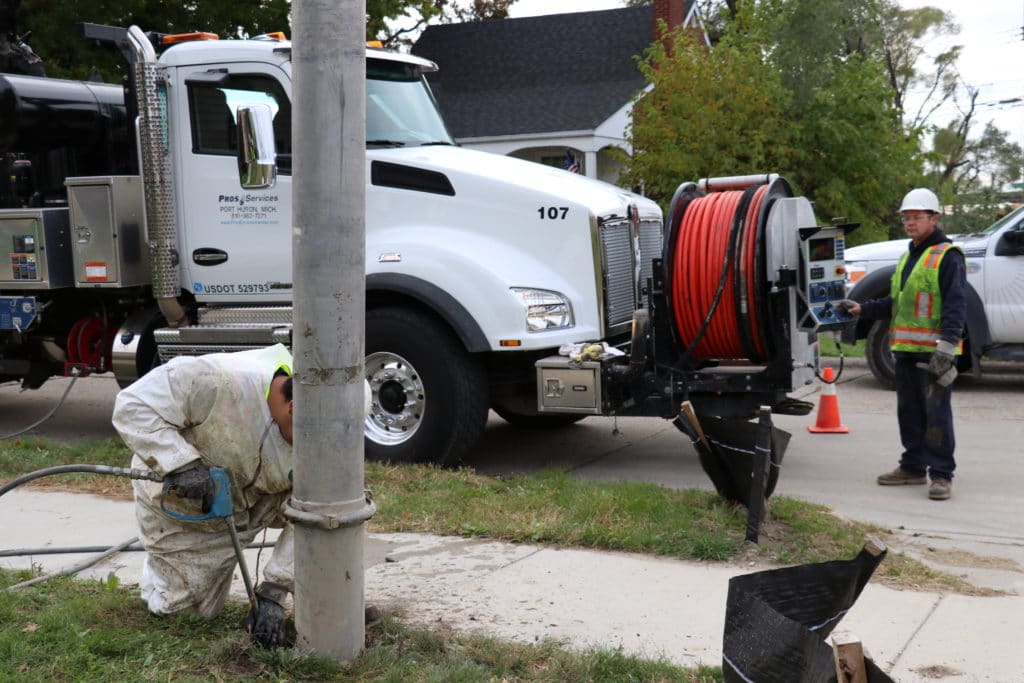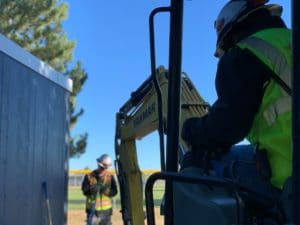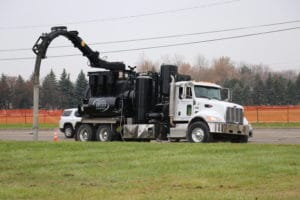
02 Nov 7 Cost Savings Benefits of Hydro Excavation vs. Traditional Excavation
Why Hydro Excavation
Hydro Excavation is the process of using high-pressure water and vacuum to dig or excavate soil without damaging underground utilities. In cold weather, hot pressurized water is used, making it a non-destructive procedure. Hydro-excavation, commonly referred to as daylighting, potholing, or non-destructive excavation, is used for trenching, digging utility holes and for pipe sewers.

Traditional Excavation methods use backhoes for major operations, and hand tools in smaller spaces. They’re extremely labor intensive, and because of the nature of digging, they’re potentially risky, especially when underground utilities are present.
In cold weather conditions, when soil is frozen, it’s harder to excavate using traditional methods, making them more expensive as well as potentially dangerous. Using hydro excavation techniques make digging much more efficient, more accurate, faster and safer, since the surrounding soil is left undisturbed.
Benefits of Hydro Excavation
1. Faster
Hydro excavation can be a cost effective solution to digging because of the amount of time and labor saved by using a more efficient method. Hydro excavation digging is faster because there is no necessity for transporting debris into dump trucks and dump sites. The vacuuming process of hydro excavation uses suction to store the displaced dirt in the debris tank on the truck.
2. Less Labor Intensive
Traditional digging techniques are more labor intensive, because they use tools such as backhoes and hand tools, therefore it needs more workers. Conversely, the number of workers needed for a hydro excavation is much fewer.
3. Greater Precision
In some scenarios municipal and federal laws don’t approve of traditional excavation methods, especially in projects that have fragile, pre-existing factors such as underground utilities in tight spaces. Hydro excavation allows these projects to remain compliant by reducing backfilling as well as any additional repairs which are common with traditional techniques.
4. Safer, Less Riskier
Traditional methods of excavation involve labor-intensive techniques and equipment, sometimes including explosives. These methods come with additional risk factors such as falling debris, cave ins and even landslides in larger operations, creating hazardous conditions for the workers. In cold weather climates, cutting through frozen ground is even harder, making the traditional methods even more dangerous. In contrast, because hydro excavation uses an extension to emit water, the workers are at a safer distance from the worksite.
5. Reduced Service Interruptions
Using traditional excavation methods such as drilling and backhoeing have frequently been a cause of service interruptions whenever underground infrastructure lines are damaged. Typically these are expensive repairs, leading up to millions of dollars in some larger projects.
6. Reduced Insurance Rates
Since hydro excavation is considered safer with less risk of damage to the surrounding environment, insurance agencies offer better rates to companies that use hydro excavation techniques. These savings are then passed down to the customer.
7. Better for the environment
Since hydro excavation uses water, it’s a non-hazardous medium used for digging holes and trenches. In addition, there’s no damage to the existing underground utilities, because there’s no digging to disturb the soil.

Overall Cost Savings Benefits of Hydro Excavation
Considering all the above factors in favor of hydro excavation, it is considered a best practice by cities, municipalities and public utility companies. In one project, the hydro excavation unit completed a project in 1/3rd the amount of time needed by hand digging crew, and with ½ the size of the team. Performing a cost analysis against traditional methods of excavation has proven to be at least 10 times faster, and at least 4 times cheaper, in one scenario.
If you’re in need of hydro excavation services to perform a safe and efficient operation, contact us to learn more.

